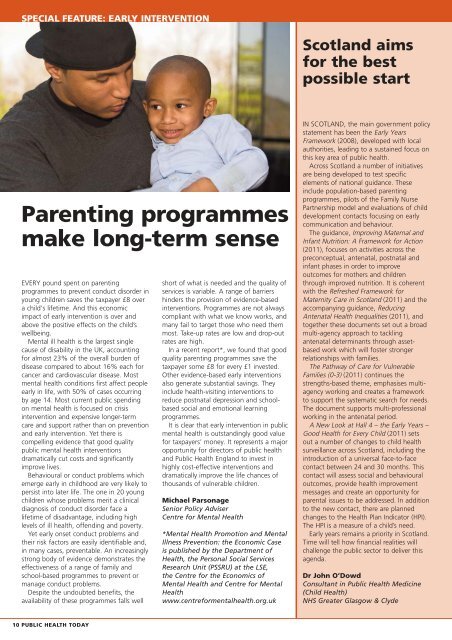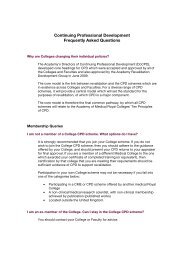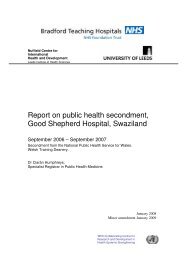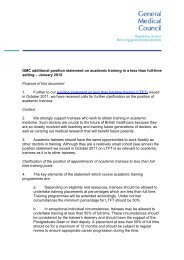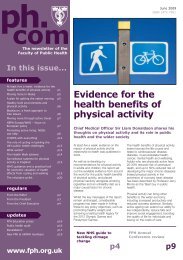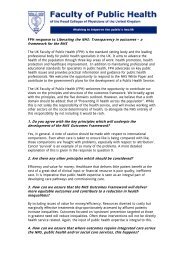PHT June 2011_Jan 10 - UK Faculty of Public Health
PHT June 2011_Jan 10 - UK Faculty of Public Health
PHT June 2011_Jan 10 - UK Faculty of Public Health
Create successful ePaper yourself
Turn your PDF publications into a flip-book with our unique Google optimized e-Paper software.
SPECIAL FEATURE: EARLY INTERVENTION<br />
Scotland aims<br />
for the best<br />
possible start<br />
Parenting programmes<br />
make long-term sense<br />
EVERY pound spent on parenting<br />
programmes to prevent conduct disorder in<br />
young children saves the taxpayer £8 over<br />
a child's lifetime. And this economic<br />
impact <strong>of</strong> early intervention is over and<br />
above the positive effects on the child’s<br />
wellbeing.<br />
Mental ill health is the largest single<br />
cause <strong>of</strong> disability in the <strong>UK</strong>, accounting<br />
for almost 23% <strong>of</strong> the overall burden <strong>of</strong><br />
disease compared to about 16% each for<br />
cancer and cardiovascular disease. Most<br />
mental health conditions first affect people<br />
early in life, with 50% <strong>of</strong> cases occurring<br />
by age 14. Most current public spending<br />
on mental health is focused on crisis<br />
intervention and expensive longer-term<br />
care and support rather than on prevention<br />
and early intervention. Yet there is<br />
compelling evidence that good quality<br />
public mental health interventions<br />
dramatically cut costs and significantly<br />
improve lives.<br />
Behavioural or conduct problems which<br />
emerge early in childhood are very likely to<br />
persist into later life. The one in 20 young<br />
children whose problems merit a clinical<br />
diagnosis <strong>of</strong> conduct disorder face a<br />
lifetime <strong>of</strong> disadvantage, including high<br />
levels <strong>of</strong> ill health, <strong>of</strong>fending and poverty.<br />
Yet early onset conduct problems and<br />
their risk factors are easily identifiable and,<br />
in many cases, preventable. An increasingly<br />
strong body <strong>of</strong> evidence demonstrates the<br />
effectiveness <strong>of</strong> a range <strong>of</strong> family and<br />
school-based programmes to prevent or<br />
manage conduct problems.<br />
Despite the undoubted benefits, the<br />
availability <strong>of</strong> these programmes falls well<br />
short <strong>of</strong> what is needed and the quality <strong>of</strong><br />
services is variable. A range <strong>of</strong> barriers<br />
hinders the provision <strong>of</strong> evidence-based<br />
interventions. Programmes are not always<br />
compliant with what we know works, and<br />
many fail to target those who need them<br />
most. Take-up rates are low and drop-out<br />
rates are high.<br />
In a recent report*, we found that good<br />
quality parenting programmes save the<br />
taxpayer some £8 for every £1 invested.<br />
Other evidence-based early interventions<br />
also generate substantial savings. They<br />
include health-visiting interventions to<br />
reduce postnatal depression and schoolbased<br />
social and emotional learning<br />
programmes.<br />
It is clear that early intervention in public<br />
mental health is outstandingly good value<br />
for taxpayers’ money. It represents a major<br />
opportunity for directors <strong>of</strong> public health<br />
and <strong>Public</strong> <strong>Health</strong> England to invest in<br />
highly cost-effective interventions and<br />
dramatically improve the life chances <strong>of</strong><br />
thousands <strong>of</strong> vulnerable children.<br />
Michael Parsonage<br />
Senior Policy Adviser<br />
Centre for Mental <strong>Health</strong><br />
*Mental <strong>Health</strong> Promotion and Mental<br />
Illness Prevention: the Economic Case<br />
is published by the Department <strong>of</strong><br />
<strong>Health</strong>, the Personal Social Services<br />
Research Unit (PSSRU) at the LSE,<br />
the Centre for the Economics <strong>of</strong><br />
Mental <strong>Health</strong> and Centre for Mental<br />
<strong>Health</strong><br />
www.centreformentalhealth.org.uk<br />
IN SCOTLAND, the main government policy<br />
statement has been the Early Years<br />
Framework (2008), developed with local<br />
authorities, leading to a sustained focus on<br />
this key area <strong>of</strong> public health.<br />
Across Scotland a number <strong>of</strong> initiatives<br />
are being developed to test specific<br />
elements <strong>of</strong> national guidance. These<br />
include population-based parenting<br />
programmes, pilots <strong>of</strong> the Family Nurse<br />
Partnership model and evaluations <strong>of</strong> child<br />
development contacts focusing on early<br />
communication and behaviour.<br />
The guidance, Improving Maternal and<br />
Infant Nutrition: A Framework for Action<br />
(<strong>2011</strong>), focuses on activities across the<br />
preconceptual, antenatal, postnatal and<br />
infant phases in order to improve<br />
outcomes for mothers and children<br />
through improved nutrition. It is coherent<br />
with the Refreshed Framework for<br />
Maternity Care in Scotland (<strong>2011</strong>) and the<br />
accompanying guidance, Reducing<br />
Antenatal <strong>Health</strong> Inequalities (<strong>2011</strong>), and<br />
together these documents set out a broad<br />
multi-agency approach to tackling<br />
antenatal determinants through assetbased<br />
work which will foster stronger<br />
relationships with families.<br />
The Pathway <strong>of</strong> Care for Vulnerable<br />
Families (0-3) (<strong>2011</strong>) continues the<br />
strengths-based theme, emphasises multiagency<br />
working and creates a framework<br />
to support the systematic search for needs.<br />
The document supports multi-pr<strong>of</strong>essional<br />
working in the antenatal period.<br />
A New Look at Hall 4 – the Early Years –<br />
Good <strong>Health</strong> for Every Child (<strong>2011</strong>) sets<br />
out a number <strong>of</strong> changes to child health<br />
surveillance across Scotland, including the<br />
introduction <strong>of</strong> a universal face-to-face<br />
contact between 24 and 30 months. This<br />
contact will assess social and behavioural<br />
outcomes, provide health improvement<br />
messages and create an opportunity for<br />
parental issues to be addressed. In addition<br />
to the new contact, there are planned<br />
changes to the <strong>Health</strong> Plan Indicator (HPI).<br />
The HPI is a measure <strong>of</strong> a child’s need.<br />
Early years remains a priority in Scotland.<br />
Time will tell how financial realities will<br />
challenge the public sector to deliver this<br />
agenda.<br />
Dr John O’Dowd<br />
Consultant in <strong>Public</strong> <strong>Health</strong> Medicine<br />
(Child <strong>Health</strong>)<br />
NHS Greater Glasgow & Clyde<br />
<strong>10</strong> PUBLIC HEALTH TODAY


